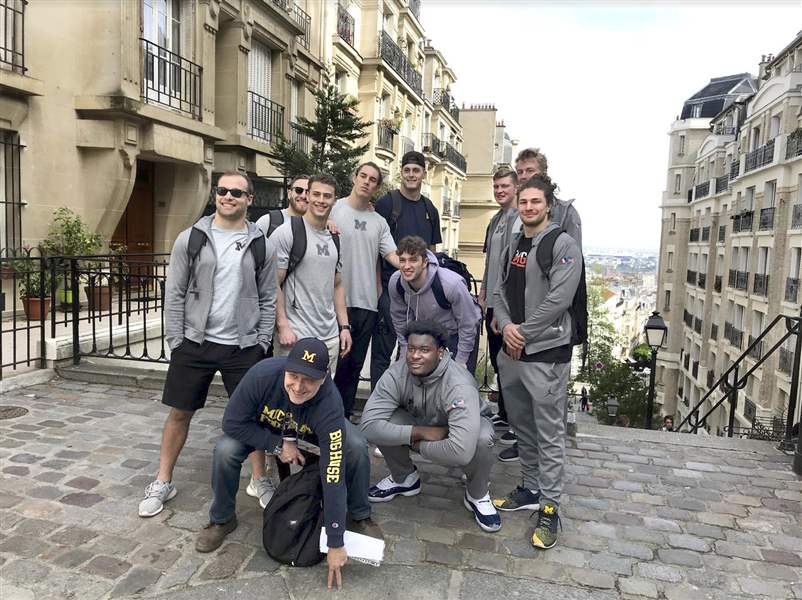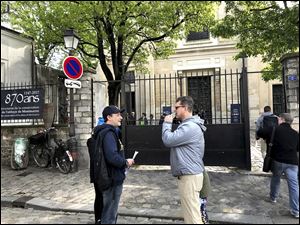
Foreign relations: Michigan mulls idea of playing international game
5/6/2018
Michigan players pose during a treasure hunt at Montmarte. Members of the UM Alumni Club of Paris organized the event. University of Michigan football team visit Paris's Montmartre neighborhood in the 18th arrondissement.
THE BLADE/KYLE ROWLAND
Buy This Image
PARIS — Foreign trips are here to stay for Michigan football.
An international game also might not be far behind.
The University of Michigan had preliminary discussions in summer 2017 about playing a game in Rome, according to Jim Harbaugh. UM and AS Roma, an Italian professional soccer club, have developed a relationship during the past year.

Jim Harbaugh talks with a member of the UM Alumni Club of Paris. University of Michigan football team visit Paris's Montmartre neighborhood in the 18th arrondissement.
The football team traveled to Rome in April, 2017 and AS Roma had a soccer match at Comerica Park in July. A few Roma players stopped in Ann Arbor for a Michigan football practice.
“Yeah, definitely would consider [playing a game in Rome],” Harbaugh said last year. “The AS Roma folks have been so great. We'd love to partner with them in any and every way. With their new stadium coming out, I think that’d be natural for Michigan to play a game here when that opens.”
The $1.3 billion, 52,000-seat Stadio Della Roma is projected to open in 2020. The Wolverines canceled a home-and-home series with Virginia Tech for 2020 and 2021 in March, paying the Hokies $375,000 to get out of the contract. Arkansas State replaced the Hokies on the 2020 schedule. Two open dates remain in 2021.
In Paris this spring, Harbaugh reiterated his openness for a future international game.
“We’d never give up a home game,” he said. “We’d never give up a chance to play in Michigan Stadium. But to do an away game here, sure. That would be the possibility.”
International regular-season games in college football are not unprecedented. There have been five since 2012 — three in Dublin and two in Sydney. The Bahamas Bowl has been played annually since 2014 and the Coca-Cola Classic was played in Tokyo from 1977-93.
The regular-season games are made-for-TV events that often result in a net profit for the schools who play in them. Hawaii and Cal opened the 2016 season in Sydney, and the Rainbow Warriors made in the mid-six figures.
Boston College paid Georgia Tech $900,000 for the teams’ 2016 game in Ireland. Notre Dame and Navy split $1 million in 1996 when the two schools played in Dublin, and it’s thought they received substantially more in 2012.
“It was not an easy trip, but [coach Nick Rolovich] saw the benefits,” Hawaii athletic director David Matlin said. “It was definitely a challenge, just making sure all the kids had passports and visas. One thing for us, every flight we go on is a pretty long flight. We’re used to packing up. We had to do several site visits to see what facilities they had as far as strength and conditioning and practice fields. There are just a lot of logistics for health and safety.”
The fields in Ireland and Australia had to be retrofitted because the games were played in rugby stadiums.
Hawaii took a wider view of its game, taking admissions staff and members of the Hawaii Tourism Authority to promote the university and islands to Australians.
“It was a marketing opportunity for the entire university,” Matlin said, “not just athletics.”
The number of Australian students has risen, and the football team’s recruiting efforts in the country also saw an increase. This season, the Rainbow Warriors have four Australians on the roster.
Hawaii had a 200-person traveling party, a number that includes the team. The team stayed in the Olympic Village from the 2000 Sydney games, which offered plenty of resources. One of the biggest challenges was related to school and missing an entire week of classes. Because of the travel constraints, Hawaii and Cal were given an exemption to play one week before the rest of FBS began play.
“You have to really work with your academic folks,” Matlin said. “We took a lot with us to make sure players were staying on track.”
The logistics are the most taxing aspect of international games. Eighteen months is the typical starting point. Mike Huff, Georgia Tech’s director of football operations, made multiple site visits to Dublin, scoping out hotels and practice facilities. What he discovered was the opposite of Texas.
Everything was smaller in Ireland.
“Shoot, man, it was a lot,” he said. “We wanted everything over there to mimic what we do at home. The guys knew they were playing away from home, but we wanted them to be as comfortable as possible.”
Right down to their food choices.
“They aren't used to cooking American food,” Huff said of the hotel staff.
To help remedy that, Georgia Tech’s advance team had its hotel’s chef make the pregame menu on one of its trips to Ireland. Team members wanted to see how long it took, what it tasted like, then make some tweaks. The type of flour used in Ireland is different than the United States, they made breaded chicken instead of fried, and eggs also are prepared differently. Huff actually had a Marriott chef in the U.S. work in concert with his Irish counterparts.
These were all little details that needed to be sorted out and aspects of planning that the general public never would realize.
“It was pretty challenging,” Huff said. “I tell people it was a bowl game magnified by 10.”
He estimated Matt Conway, Boston College’s associate AD for facilities and operations, made 10 visits to Ireland. Transporting equipment is exhausting in the United States via truck. Imagine the process when using airplanes and ships.
It takes a while for a ship to get from the U.S. to Ireland, so Georgia Tech had to figure out what was needed in Atlanta before traveling. Every school that plays internationally and transports equipment must fill out a carnet, an international customs and temporary export-import document. Carnets are used to clear customs without paying duties and import taxes on merchandise that will be re-exported within 12 months.
The tedious process was chided by Michigan assistant equipment manager Sonny Anderson last year in Rome and contributed to the Wolverines’ decision not to practice in Paris. Every single thing that goes over must be documented in detail, and it all has to come back in the same packaging, even if it’s going to be discarded upon arrival.
“It killed our equipment guys,” Huff said. “Logistically, there were a lot of groups. We all had to be on the same page. There’s no forgetting stuff. You better make sure you got everything.”
Said Matlin: “It’s a lot of planning. The logistics are a little overwhelming.”
Contact Kyle Rowland at: krowland@theblade.com, 419-724-6110, or on Twitter @KyleRowland.